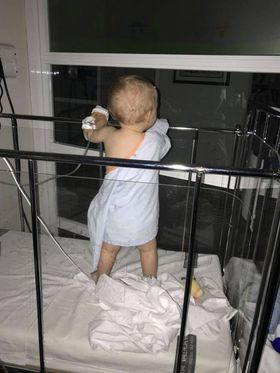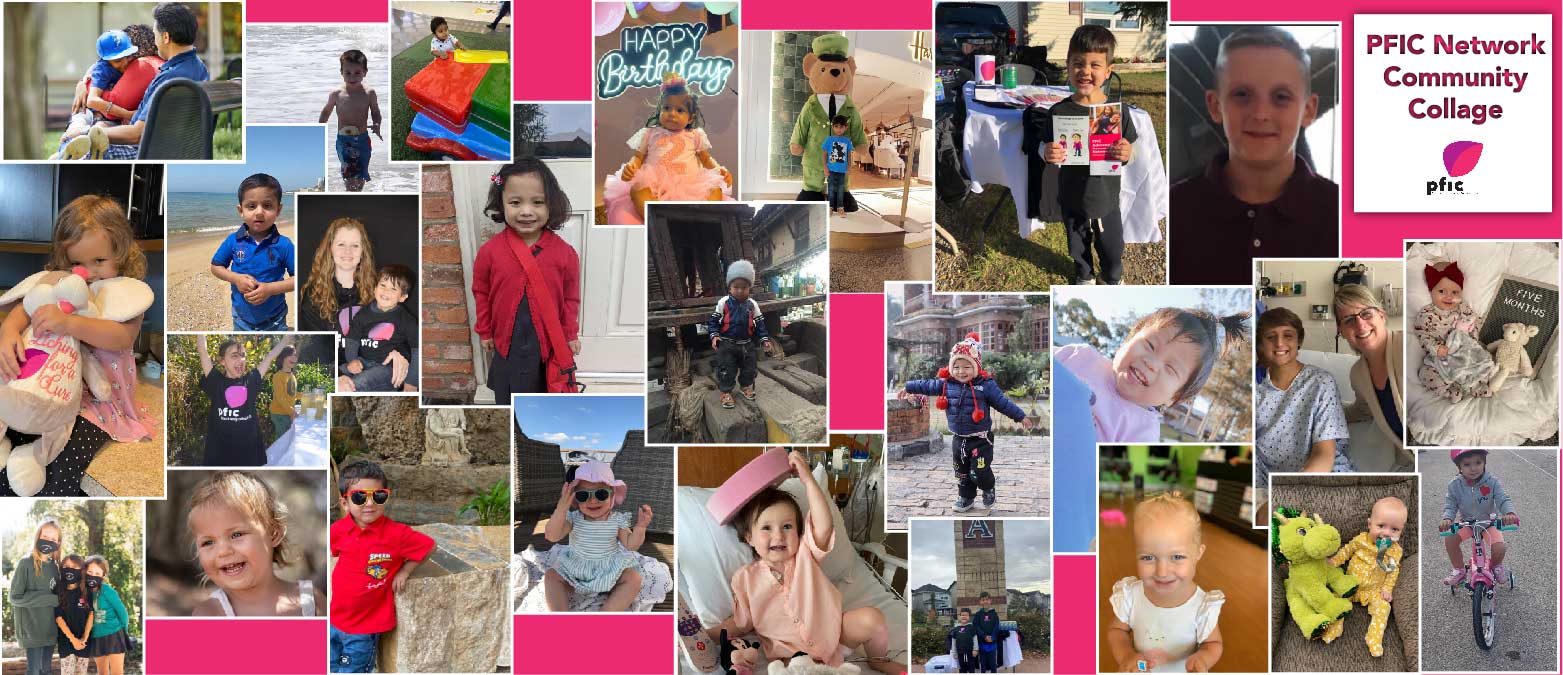Story Sunday – Sophie & Eva – A Positive Outlook
This week’s Story Sunday is a Rare Disease Day special! Rare Disease Day is tomorrow, February 28, and if you want to Share Your Story for Rare Disease Day email tyler@pfic.org. In this story I interviewed Sophie Bourton, a PFIC mom who lives in the UK. Her story is so good because it provides a great look into advocacy, finding what works, and staying positive.
Sophie’s timeline is a little different as her story starts with her and not her child. When she was 16 she started getting sick and at 19 they realized she had gallstones. When she was pregnant she also had obstetric cholestasis. These were both signs she was a carrier of PFIC. She never knew why she was sick and had gallstones at such an early age and she found it odd that the doctors never looked into it further.
When her daughter Eva was born she was very thin, her liver levels were completely off and she was in the hospital over and over with “failure to thrive”. She was not growing, her salt levels were low, and she was not absorbing any nutrients either. The doctors said that her liver levels would regulate, that it was common for babies to experience bouts of irregularity but Sophie had a feeling that they were wrong. The obstetric cholestasis Sophie experienced was her first clue. Sophie joined a facebook group for mothers with obstetric cholestasis asking what could be the cause. Finally another mother responded saying that there has been a link to two different diseases. One of them being PFIC.

Sophie began pushing the doctors to do some tests on Eva and they found that she did in fact have PFIC 3. It took 9 months for Eva to be diagnosed though it would’ve taken longer if she didn’t push them to do the tests. Even then, to get the genetic sequencing results for themselves it took 6 months. Sophie’s husband has the normal PFIC 3 mutation and Sophie has a varied version of the same mutation. Sophie did not know she was a carrier until Eva was diagnosed. She said that the doctor told her that her gallstones at such a young age should have been investigated further especially since they had been in her family for a few generations. She has been referred to have some liver tests now to make sure her liver levels remain normal after having obstetric cholestasis during pregnancy and her liver levels being so up and down.
One of the main symptoms of PFIC that Eva experienced was poor nutrition, which doesn’t get talked about enough. Eva Wren had nutrition issues and they did not know if it was allergy related, PFIC related, or both with the potential of food allergies related to PFIC. Eva couldn’t keep any food in her. She had constant diarrhea and threw most of her food up. Nothing seemed to help and she wasn’t getting much better as she got older. Finally, Eva started on ursodeoxycholic acid and since then Sophie said that Eva has done a complete u-turn. Eva was so thin up until she started on this medicine that she was “skeletal”, but since starting the medicine she has been putting on weight. Sophie even took Eva to the hospital for a check-up a couple days before our call and the doctor said to Sophie that she “has to watch Eva because she is ‘getting too fat.’” This is a major win! It could have seemed hopeless for the Bourton’s that Eva wasn’t going to get better when she was “skeletal” and not retaining nutrients, but they stayed positive and kept looking for something to help. Finding a drug or treatment that changes your life could be possible and the Bourton’s found just that.
They don’t know how long this will last as there is scarring on her liver. But they have had a year now where they have had relief from PFIC. She has been able to go to nursery and be a normal child. They are hoping for the best as they move forward with ursodeoxycholic acid.
I asked Sophie how she felt when the diagnosis finally came through, and her response was just like any mothers would be; “I just felt like there weren’t any options available to us. I felt sad but more so frightened for Eva. It was a domino effect where I was frightened for Eva, then frightened for us with our jobs and financially.” Sophie also mentioned that she felt hurt from people not helping them when they needed it most and that it was hard to move on from that. The pandemic, as I am sure many can relate, made it hard to cope. A lot of the coping mechanisms like seeing family, traveling, getting out of the house were all taken away at the same time.
Sophie wants Eva’s story to be a ray of hope to show other parents that there is potential in things getting better, and with research improving over time. Eva’s story has shown this so early in her life.
A Strong Advocate
Sophie has been a very strong advocate for PFIC, especially when there was a push to get the drug (Odevixibat) approved by NICE in the UK. Sophie has also joined in on the PFIC Awareness Day campaign, shared photos of Eva and now has shared her story! We are very grateful for such strong advocates. When I questioned why she advocates, and on such a high level, she said it was because she knows how important it is to spread awareness, especially for a disease that no one really knows about. Sophie told me “I was actually relieved to receive a diagnosis. When you are a first time mom, other moms can be really dismissive. Saying ‘oh yea my baby was skinny, my baby was small, my baby was this…’ and they didn’t understand the extent to which Eva was actually sick. With covid people couldn’t see her, so other people would say ‘yea don’t worry about it’ but they didn’t understand.”

Another question I posed to Sophie was “What else, other than being a parent of a child with rare disease, pushes you to put in the work, be an advocate, and share your story?” Her reply “I think really it’s just desperation to improve things for Eva. Whether it’s raising money, pushing research, or getting the drugs approved. I just want to help her, and then even if one person is helped get a diagnosis because of what I have done, posted, or said then it was worth my time.” Sophie also said that she can see why it is hard for parents to do the advocacy work, when your child doesn’t sleep through the night, is itchy, is still sick every day, it is almost impossible to do advocacy work. Now that Eva is well, Sophie wants to make the most of the time, and do as much as she can while she has the time.
The Bourton family was also another example of utilizing the financial assistance available for families affected by PFIC. They ended up using the Children’s Liver Disease Foundation, and received financial assistance through them, and as Sophie put it “that really saved our bacon.” If you are in need of financial assistance, it never hurts to ask. We have our financial assistance program set up to help families in need and all you have to do is apply.
I finished the interview asking the same question as all the other interviews. What is one thing you want people to know about PFIC patients? Sophie answered “I want people to know that it’s not just a liver disease, it affects every part of the body. I think people underestimate how important the liver is and it causes all of the things from nutrition to development, anywhere from size to eyesight.” I thought this was an amazing answer, and it was one I had not heard before.
It was a lot of fun getting to know Sophie and Eva’s story, as well as hearing all of the input she had on the disease, the network, and staying positive with a rare disease. Thanks Sophie! I hope everyone enjoyed this edition of Story Sunday and got a positive message from such a positive person.
